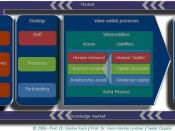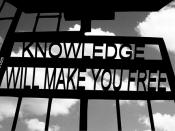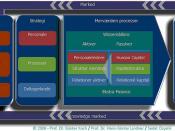"To define Wisdom is a task that requires more wisdom than any of us can have. Thus, we cannot quite comprehend the nature of wisdom because of our own lack of it." Although there is no clear definition of wisdom I feel that there are a few main quality groupings that a person with wisdom must have a good handle of. The qualities necessary to acquire the status of wisdom include understanding, intuition, and accumulated knowledge.
Understanding is key in the quest for wisdom. It is how you are able to absorb it. To understand is to "know and comprehend; realize" . A wise person understands people through the course of dealing with a variety of people, learns from experience, listens to various sides of an issue, considers all points of view, and is a good listener.
Intuition is a quality that gets better with time for most people.
It is "immediate mental apprehension with out reasoning; immediate insight" . When a person is wise they are able to see through things, read between the lines, and understand the essence of a situation. Intuition acts partly as a sense of truth, and should be without bias. "Wisdom is only found in truth."
Accumulated knowledge seems to be one of the qualities of wisdom that is most recognized, and can be defined as "knowing; having recognized; what one knows" . I don't believe that this is limited to just a vast stretch of knowledge, I believe it has to do with the observatory senses as well. Wisdom is perception, sensibility, seeking answers, thinking before acting (or speaking), foresight, farseeing, and knowing when to be discrete. Knowledge can become greater over time, but I do not feel that wisdom is limited to those who are older. In some ways,



Cool
loved it
4 out of 4 people found this comment useful.